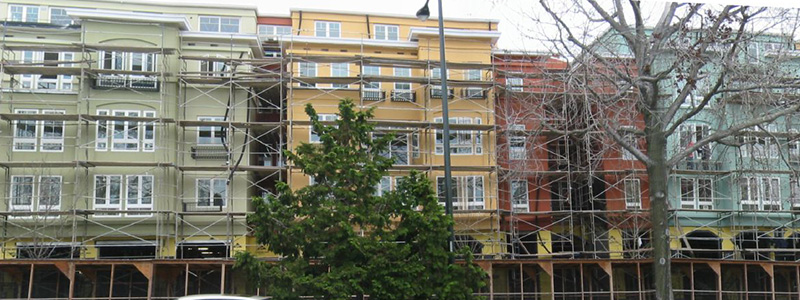
Mixed used construction in Berkeley, California (Photo: Anirvan/Flickr)
Housing affordability in California continues to be crippled by challenges in producing the 200,000 housing units per year necessary to meet the needs of families, like the lack of available land where more homes can be built.
Last November in Fresno, the California Economic Summit – hosted by California Forward and its California Stewardship Network – included an emphasis on producing an adequate supply of housing that provides affordable options. Out of the Summit came a set of priority actions with a focus on expanding the supply of land available for development including using underutilized commercial developments that are no longer economically viable.
This idea has been embraced in Senate Bill 1385, which is expected to be heard in the Senate Governance and Finance Committee on May 28.
Introduced by State Senator Anna Caballero (12th Senate District), SB 1385 creates the Neighborhood Homes Act, which allows residential developments on existing land currently zoned for commercial office and retail spaces such as strip malls. Essentially, the bill would “upzone” commercial and retail properties to allow residential uses at densities that are deemed affordable by design, such as low-rise apartments, townhomes, and condominiums.
“California faces an extreme housing supply and affordability crisis, which will only be solved with innovative solutions,” said Senator Caballero. “To move the needle and help achieve housing and climate goals that we must meet to give Californians a future, we must incentivize and streamline the building process, to allow the adaptive reuse of vacant or under used commercial properties, strip malls, and large shopping centers.”
With several major retailers already filing for bankruptcy like JC Penney, it’s likely more will follow, leaving behind unused buildings and land underneath.
“Unfortunately, we expect to see an increase in underutilized and vacant commercial spaces exacerbated by COVID-19, and SB 1385 provides a promising pathway for both landowners and developers to help meet the growing demands for housing in the state,” said Dan Dunmoyer, president and CEO of the California Building Industry Association.
With no additional cost to the state, SB 1385 aims to achieve the following:
- Allow residential development on commercially zoned retail and office spaces.
- Requires housing development to meet or exceed density deemed appropriate to accommodate affordable housing.
- Expands the state’s ministerial housing approval process to include commercial properties that have been vacant or less than 50% occupied for the last three years.
- Require new housing to abide by existing local planning, zoning, parking, design and development ordinances in compliance with the California Environmental Quality Act, the Coastal act, and all other applicable state laws. The bill makes no changes to environmental, public health, labor and housing laws.
- Establish a Community Finance District with a voluntary opt-in for new housing to provide for and maintain public infrastructure and services for these proprieties.
“SB 1385 represents a powerful incentive and an effective tool to help the state achieve its housing goals and ignite economic activity, especially in regions that would benefit from revitalization,” said Micah Weinberg, CEO of California Forward, which is sponsoring the bill. “We are encouraged that the work leading up to and at the California Economic Summit continues to yield valuable solutions that can help all Californians prosper.”
Additionally, the bill would help cities and counties meet their Regional Housing Needs Assessment (RHNA) obligations to rezone more property for residential use.
With an average home costing 2.5 times higher and rents around 50% higher than the national average, the need to find ways to increase available land for residential developments plays a critical part in meeting the demand and making housing more affordable in the state.

